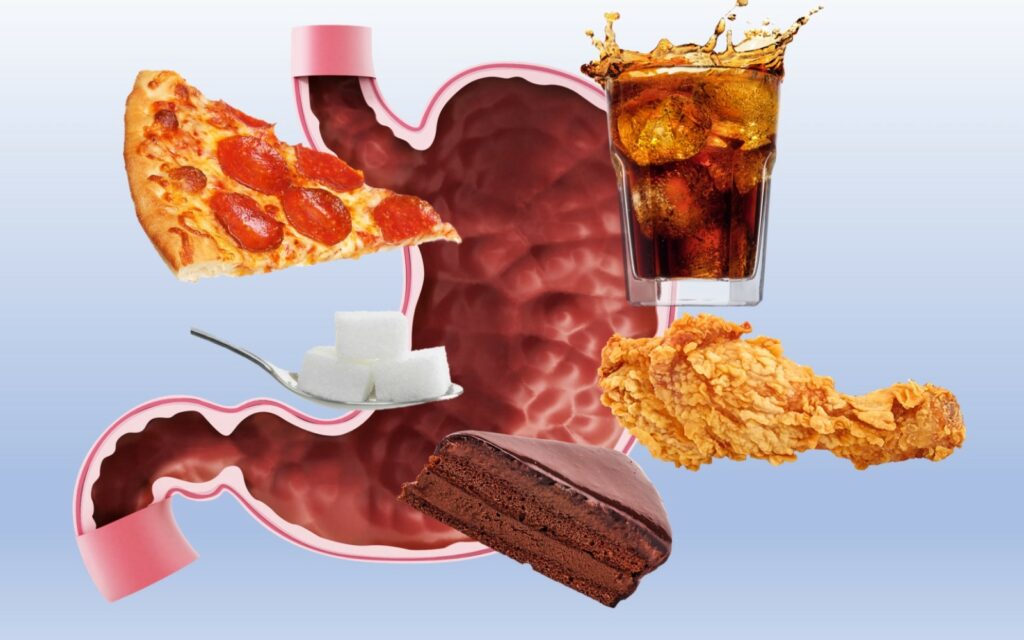
Magnesium holds vital importance but an alarming 60 – 80% of the populace fails to intake sufficient amounts. While the necessity of adequate consumption remains valid, the degree to which you absorb and assimilate it emerges as the pivotal factor.
Beyond the mere intake of magnesium, numerous elements can impede absorption or heighten the loss of this essential mineral. Acknowledging these obstacles becomes crucial when dealing with magnesium deficiency.
This article will delve into the consequences of dietary preferences and the diverse factors that obstruct the accurate assimilation of magnesium or contribute to its reduction within the body. By grasping these aspects, you can adopt proactive measures to uphold ideal magnesium levels and enhance your overall state of wellness.
Foods That Deplete Magnesium Or Block Magnesium Absorption
High Anti-Nutrient Foods
Anti-nutrients align with their name’s implication—they are compounds capable of obstructing nutrient absorption. More precisely, phytic acid and oxalates possess the capacity to hinder the assimilation of magnesium.
Phytic Acid
In humans, phytic acid has the potential to impede the absorption of magnesium through a mechanism known as chelation. This process takes place as phytic acid binds with minerals such as magnesium within the gastrointestinal tract, resulting in the creation of magnesium phytates. These phytates are insoluble and cannot be digested.
Consequently, the magnesium phytate can pass through your system and be expelled through faeces. This implies that despite a food’s substantial magnesium content, phytic acid can curtail the extent to which you absorb and utilize magnesium.
Some of the foods highest in phytates include:
• Nuts and seeds
• Legumes
• Beans
• Grains
If some of your preferred and possibly most nutritious foods are on this list, there’s no need to worry. Implementing a few additional measures during the preparation stage, such as soaking, fermenting and sprouting, can diminish the presence of phytic acid.
Oxalates
Oxalates can also interfere with magnesium absorption. Foods particularly high in oxalates include:
• Spinach
• Beets
• Rhubarb
• Wheat bran
• Nuts
• Chocolate
• Tea
• Strawberries
Oxalates are compounds with a negative charge that attract positively charged ions like magnesium. The interaction between oxalates and magnesium results in the formation of insoluble crystals known as magnesium oxalate.
This interaction mainly occurs within the gastrointestinal tract. When oxalates and magnesium bind tightly to each other, creating magnesium oxalate, the magnesium becomes unable to dissolve. Consequently, a significant portion of magnesium oxalate passes through the digestive system without being absorbed.
In a study involving nine healthy adults, the effects of a meal containing spinach (high oxalate content) were compared to a meal containing kale (low oxalate content) in terms of magnesium absorption. The participants consumed phytate-free bread along with 300 grams of spinach and kale on separate occasions.
Magnesium absorption was significantly lower with the high oxalate meal. Subjects absorbed:
• 27% of the magnesium in the meal with spinach
• 36% of the magnesium in the meal with kale
Even with a 30% naturally higher magnesium of spinach compared to kale, subjects absorbed less magnesium with the spinach due to higher oxalate levels.
So, how can you reduce oxalates? Soaking and boiling are the most effective methods.
Soy
With the rising popularity of soy, as it gains traction as both a dairy alternative and a superfood, it becomes crucial to investigate its potential influence on nutrient absorption, particularly its impact on magnesium uptake. There’s a possibility that soy might be affecting your body’s capacity to absorb magnesium. Phytic acid constitutes roughly two percent of soybeans and soy protein.
A study conducted with animals to explore the impacts of dairy milk versus soy milk on magnesium absorption yielded intriguing findings. The participants were divided into two groups: one group consumed dairy milk while the other consumed soy milk for a duration of four weeks. Upon thorough examination, it was observed that the group consuming soy milk consistently displayed lower magnesium levels compared to the group consuming dairy milk.
Remarkably, despite having diets that were otherwise identical, individuals who consumed soy milk exhibited reduced magnesium absorption in the lower intestine. This observation implies that components inherent to soy milk, such as phytic acid, could potentially impede the absorption of magnesium in the gastrointestinal tract.
Individual variations in diet, overall nutrient intake, and health status can influence the magnitude of this impact. Furthermore, considering alternative magnesium-rich food sources and implementing approaches to reduce phytic acid content, like fermentation or soaking, could potentially help alleviate any possible concerns linked to soy consumption.
Soda
Soda encompasses various components that might hinder your capacity to absorb magnesium. Both fructose and phosphorus additives present in soda can disrupt magnesium absorption and promote its excretion from the body.
In a controlled animal study, subjects drank Coca-cola, 7Up or Pepsi for four months. The animals drinking soda had reduced magnesium levels after just two weeks and even more after four months. The Coca-cola group lost the most magnesium.

Processed Foods
Processed foods generally exhibit lower magnesium content compared to whole, unprocessed foods. The techniques employed in processing such foods often involve the removal or reduction of their inherent magnesium content. This is particularly true for cereal grains like:
• Rice
• Oats
• Corn
• Wheat
While processed foods are often fortified with vitamins and minerals, magnesium is not one of them. Prioritize adopting a well-rounded diet that incorporates a diverse selection of whole, unprocessed foods. These whole foods inherently contain elevated levels of magnesium and offer supplementary health advantages beyond their mineral content alone.
Caffeine
Consuming caffeine leads to an elevated excretion of magnesium through urine rather than facilitating its absorption.
A controlled study of 17 healthy subjects followed identical magnesium-containing diets. Subjects consumed 3 mg/kg (2.2 lbs) of lean body mass at 7 am and again at 10 am. Urinary magnesium excretion was highest six hours following the second dose of caffeine and then began to decrease.
During night-time, your body employs natural mechanisms to preserve minerals such as magnesium. Nonetheless, these mechanisms fall short of counteracting the mineral depletion induced by morning caffeine consumption. In simple terms, when you consume caffeine in the morning, your body’s attempts to offset the heightened magnesium loss triggered by caffeine prove inadequate.
Protein
Following a high-protein diet may contribute to the reduction of magnesium levels. The process of protein metabolism generates metabolites containing sulphur, which in turn elevates the body’s acid load.
In an acidic bodily environment, the system typically employs several mechanisms to counteract the acidity. One of these involves the release of alkaline minerals such as calcium and magnesium from bone tissue. These minerals serve as buffers to counter the surplus acid and uphold the body’s pH in a balanced range. Regrettably, this process can also result in a reduction of magnesium levels.
Additional studies propose that a high-protein diet might enhance magnesium absorption by reducing its excretion through faeces. This raises a question: why the conflicting findings? An animal study could provide insights into resolving this disparity.
Animals were divided into groups receiving either a standard or high-protein diet with equivalent magnesium content. The high-protein diet yielded higher apparent magnesium levels, calculated as magnesium intake minus magnesium excreted in faeces. However, this outcome was probably due to lower faecal excretion of magnesium.
Upon employing a tracer isotope to accurately gauge magnesium absorption, researchers identified that the high-protein diet had no impact on magnesium levels.
The study indicating that a high-protein diet enhances magnesium absorption assessed magnesium levels in both faeces and urine. However, these findings probably only reflected apparent magnesium absorption rather than actual absorption rates.
Though additional research is required to comprehensively grasp the impact of a high-protein diet on your magnesium levels, it’s a factor worth keeping in mind. Ensure to monitor your magnesium levels to ascertain if this is a matter of concern for your individual situation.
Supplements That Deplete Or Prevent Magnesium Absorption

Vitamin D
Magnesium and vitamin D have an important relationship in your body. Magnesium helps activate vitamin D, keeping your bones strong and healthy. Once activated, vitamin D helps control your calcium and phosphate levels.
The enzymes responsible for processing and activating vitamin D within your body rely on magnesium for optimal functioning. Magnesium essentially functions as a facilitator for these enzymes, ensuring their effective performance. Interestingly, addressing a vitamin D deficiency could potentially lead to heightened magnesium absorption.
Because processing vitamin D requires a lot of magnesium, taking large doses (>4000 IU/day) of vitamin D for months or years can deplete magnesium. Animal studies also suggest that taking high doses increases the amount of magnesium in your urine, leading to depletion.
Rather than guessing whether or not your vitamin D levels are low, check your blood levels and work with a health practitioner to determine the appropriate vitamin D dosage.
Competing Minerals, Including Zinc And Calcium
Zinc
Elevated quantities of zinc supplements can disrupt the absorption of magnesium. This phenomenon arises due to the shared transport mechanisms in the intestines that both zinc and magnesium utilize. Consequently, an excessive intake of zinc might impede the absorption of magnesium.
In a clinical trial of 21 healthy adult males, researchers wanted to explore the effects of zinc on magnesium absorption. Subjects took 142 mg of zinc with either 230, 500, or 800 mg of calcium daily. No matter the dose of calcium, zinc decreased both magnesium absorption and balance.
Individuals consuming the calcium/zinc supplements exhibited elevated levels of magnesium in their urine and faeces. This observation implies that the interaction between magnesium (Mg) and zinc (Zn) within the intestine can influence the body’s absorption of these minerals.
Typically, the Mg/Zn ratio in the intestine is about 20:1, with about 50% of dietary magnesium absorption. However, when you have significantly more zinc, such as adding 142 mg of zinc, the Mg/Zn ratio changes to about 2:1. This change in ratio reduces magnesium absorption.
Calcium
Magnesium and calcium (Ca) play vital roles in fundamental bodily processes. They operate within a shared regulatory system and utilize receptors to sustain equilibrium. Nevertheless, magnesium and calcium can also exhibit opposing effects on each other.
The transporters responsible for magnesium (Mg) also have an affinity for calcium. These transporters are proteins that assist in the transfer of ions like Mg and Ca across cell membranes. This interaction could impact the absorption and distribution of both calcium and magnesium within the body, possibly resulting in competition for absorption in the intestines.
Researchers believe that the concentration of Ca and Mg in your body affects their absorption. When there is a low concentration of Ca and a high concentration of Mg, the transport of Mg is activated. On the other hand, a high intake of Ca can reduce the absorption rates of both Ca and Mg.
This is how it works. The ratio of Ca to Mg in the diet influences their absorption and effects on the body. When the body needs to absorb a total of ten ions of Ca and Mg and the diet contains five ions of each, it absorbs all five ions of each mineral. However, when you have a lot more of one and less of the other, such as if the diet has 45 ions of Ca and five ions of Mg, the body absorbs only nine Ca ions and one Mg ion.
Research tells us that the optimal ratio for taking calcium and magnesium is 2:1 (for example, 1,000 mg of Ca to 500 g of Mg)
Lifestyle Factors That Can Reduce Magnesium
Our overall health, including the magnesium levels within our bodies, is heavily influenced by lifestyle factors. Nonetheless, specific elements of our lifestyle can lead to a decline in magnesium levels. Grasping the impact of these lifestyle factors on magnesium levels is pivotal for sustaining optimal health and safeguarding proper magnesium levels.
Alcohol
Consuming alcohol swiftly amplifies the excretion of magnesium in your urine, showing an increase of approximately 167% to 260%. Scientists believe that this magnesium originates from your body’s reserves. If your magnesium levels are already diminished, the amount excreted might be less compared to higher magnesium levels.

A study of 24 men compared the magnesium status of alcohol drinkers and non-drinkers. While all participants consumed an equal amount of dietary magnesium, those who drank alcohol urinated out more magnesium.
The researchers suggest alcohol interferes with magnesium reabsorption from your urine into your blood. So, your kidneys leave more magnesium in your urine for excretion.
Medication
Some medications use the same pathways in your body to be absorbed, processed, and removed as magnesium. Because of this, when you take medication, there is a chance that it can interact with your magnesium levels. It’s actually a two-way street. Drugs can affect how well your body absorbs magnesium, and magnesium can affect how drugs work. Some of these interactions may be life-threatening.
Hence, it’s imperative to consult your physician or pharmacist before incorporating any new supplement, particularly if you are taking medications.
Diuretics
Thiazide diuretics and loop diuretics are medications that can influence magnesium levels in your body in different ways.
Thiazide diuretics diminish the function of a protein channel known as TRPM6 within the kidneys. This channel helps in reabsorbing magnesium from the urine back into the body. With reduced TRPM6 expression, the kidneys don’t hold on to as much magnesium, causing more magnesium loss through urine.
Loop diuretics impact magnesium in an alternate region of the kidney. They decrease magnesium reabsorption through a pathway known as the thick ascending limb within the kidney. This, in turn, results in the excretion of magnesium through urine.
Both diuretics can induce a condition known as secondary hyperaldosteronism. The hormone aldosterone, which helps regulate magnesium levels, becomes more active. The increased aldosterone levels further promote magnesium loss through urine.
Both types of diuretics can disrupt the balance of magnesium in our bodies and reduce magnesium levels.
Antacids
Though ongoing research is exploring the impact of antacids on magnesium absorption, it’s evident that they probably lead to magnesium deficiency. Some of the mechanisms behind this phenomenon have been identified by researchers.
A potential mechanism involves passive absorption, wherein magnesium moves through tiny gaps between cells in the intestinal wall. Antacids might interfere with these gaps, diminishing the quantity of magnesium that enters the bloodstream.
Another possible mechanism involves active absorption, which relies on the protein channels we already discussed, especially TRPM6 and TRPM7. These channels help transport magnesium from the intestines into the body. Antacids could interfere with the functioning of these channels, making magnesium absorption harder.
Oral Contraceptives
The use of oral contraceptives containing estrogen can lead to a reduction in magnesium levels by promoting its excretion. An examination of more than 2,000 women revealed that 67% of those using contraceptives had insufficient magnesium levels.
Another study of 100 women explored the effects of contraceptives on magnesium levels. Those taking contraceptives had significantly lower magnesium levels than the control group. Those taking oral contraceptives had the lowest magnesium levels. Additionally, researchers found that the longer women take contraceptives, the greater the magnesium deficiency.
Antibiotics
A specific group of antibiotics known as aminoglycosides can influence your magnesium levels. These broad-spectrum antibiotics are frequently prescribed, especially to children. They include antibiotics such as:
• Gentamicin
• Amikacin
• Tobramycin
• Neomycin
• Streptomycin
Like other medications already discussed, aminoglycoside antibiotics can interfere with magnesium reabsorption in the kidneys, resulting in increased renal magnesium loss. They may also induce secondary hyperaldosteronism, contributing to lower levels of magnesium in the body. Magnesium may also reduce the absorption of antibiotics.
Conclusion
Ensuring optimal magnesium levels is essential for overall wellness; however, several factors can impede absorption or lead to magnesium depletion. To address magnesium deficiency, it is important to consider the following:
• Take your main sources of magnesium away from foods that deplete or hinder its absorption, such as foods high in phytic acid and oxalates.
• Be cautious with supplements that can deplete or hinder magnesium absorption, such as high doses of vitamin D and excessive zinc intake.
• Reduce or eliminate processed foods and soda from your diet.
• Limit your caffeine and alcohol consumption.
• Consider the impact and interactions of medications on magnesium levels, such as diuretics, antibiotics, and oral contraceptives. If you’re on medication, always speak to your doctor before introducing supplements.
• Supplement with a high-quality magnesium supplement like Magnesium Breakthrough to help address deficiencies.
To better understand your magnesium levels, see your health practitioner to have your levels tested and work on a plan together to reach optimal levels.
Share:

BIOptimizers
Become A Biologically Optimized Human

Social Media
Most Popular
Diet and Mental Health
Understanding Low Stomach Acid and How Betaine HCl Can Help
Vitamins and Supplements to Help with Deep Sleep
Subscribe To Our Weekly Newsletter
Categories
Related Posts
Are Sweet Proteins A Healthy Substitute For Sugar?
Excess sugar is linked to health issues like weight gain and blood sugar imbalances. Now imagine enjoying sugar’s taste without the calories or additives—sweet proteins offer this unique advantage. Naturally derived from plants, they’re intensely sweet without extra calories and spiking your blood sugar. First-generation artificial sweeteners, and even natural options like stevia, have a bitter aftertaste. Recent
Diet and Mental Health
Estimates now show us that one in five people struggle with mood and mental health issues, making it a growing public health concern.[1] They can affect how people feel, think, and function. Despite advances in treatment, many people still struggle with symptoms every day. Commonly seen alongside these issues are poor diet, increasing nutrient deficiencies, and
Understanding Low Stomach Acid and How Betaine HCl Can Help
If you’ve ever felt a burning sensation in your chest or struggled with bloating and indigestion after eating, you might think excess stomach acid is to blame. I used to believe the same, treating every bout of discomfort with antacids and hoping for relief. But what if the real issue was too little stomach acid?
Vitamins and Supplements to Help with Deep Sleep
Sleep quality, especially deep and REM sleep, is unarguably one of the most important things to optimize, whether you want to maximize aesthetics, performance, or health. Matt learned this the hard way when he could not feel rested no matter how much he slept. He fell asleep just fine but always woke up groggy even after


